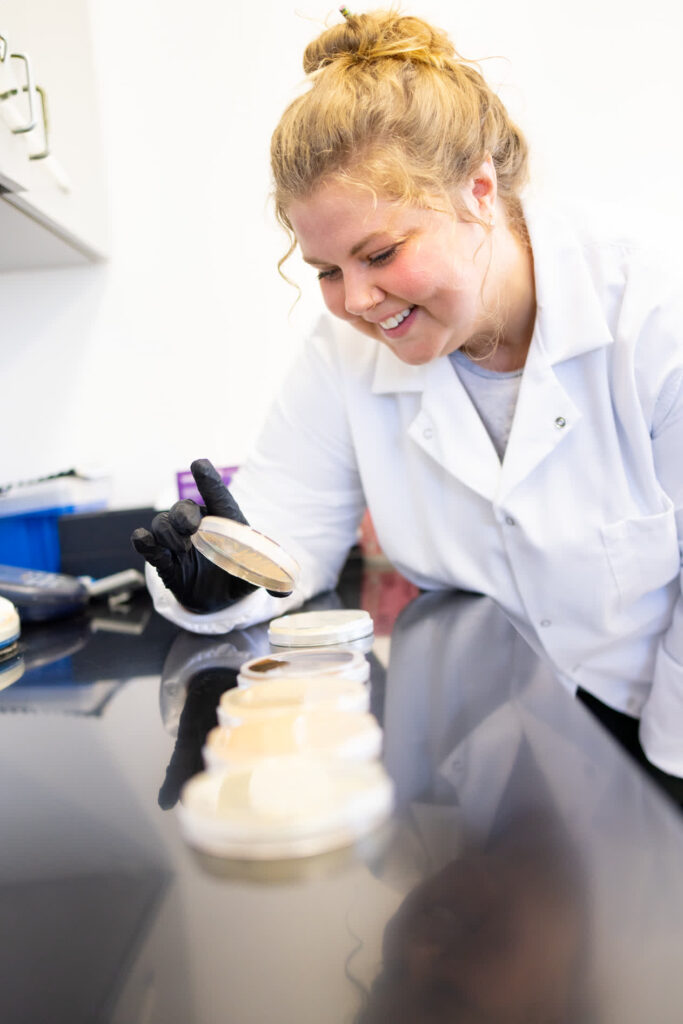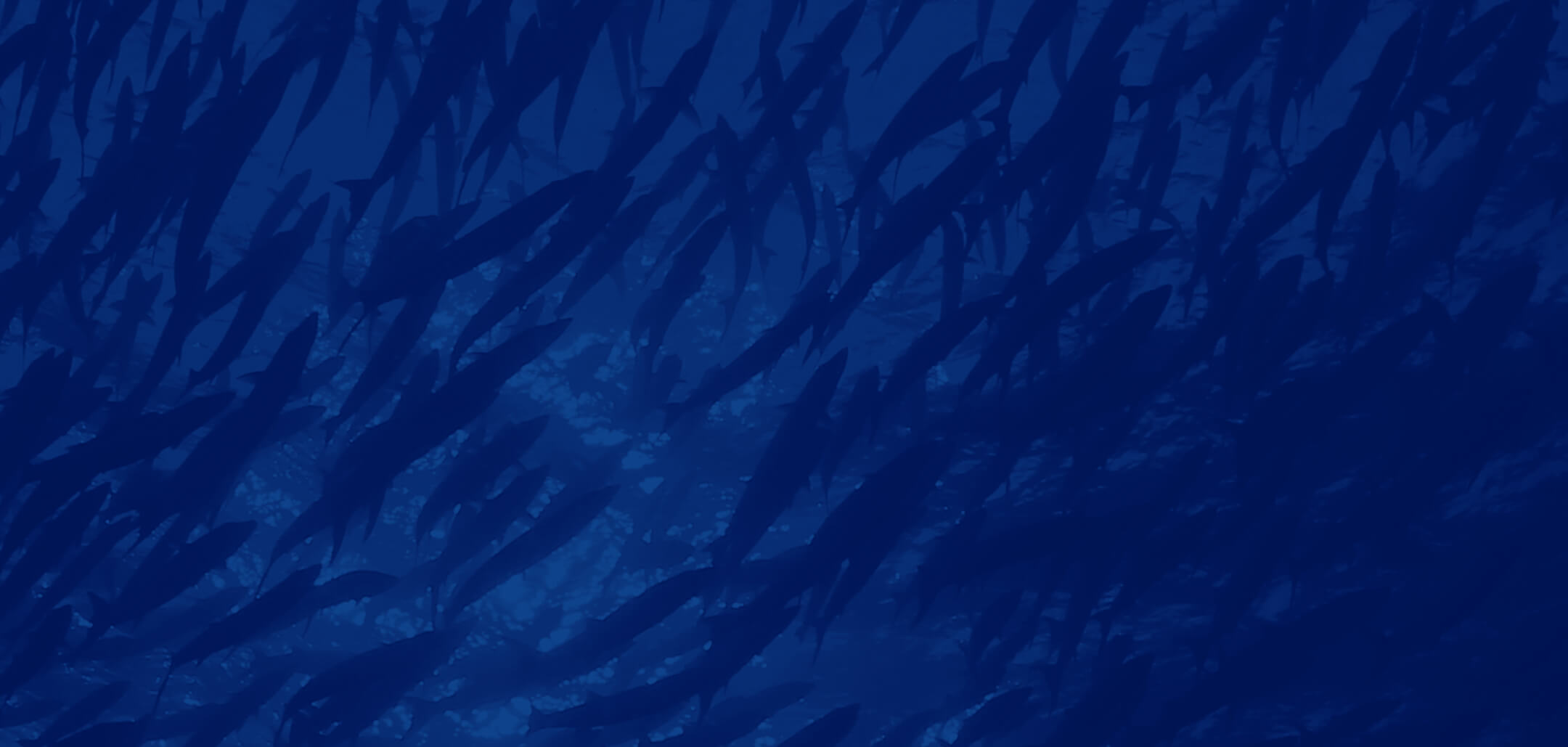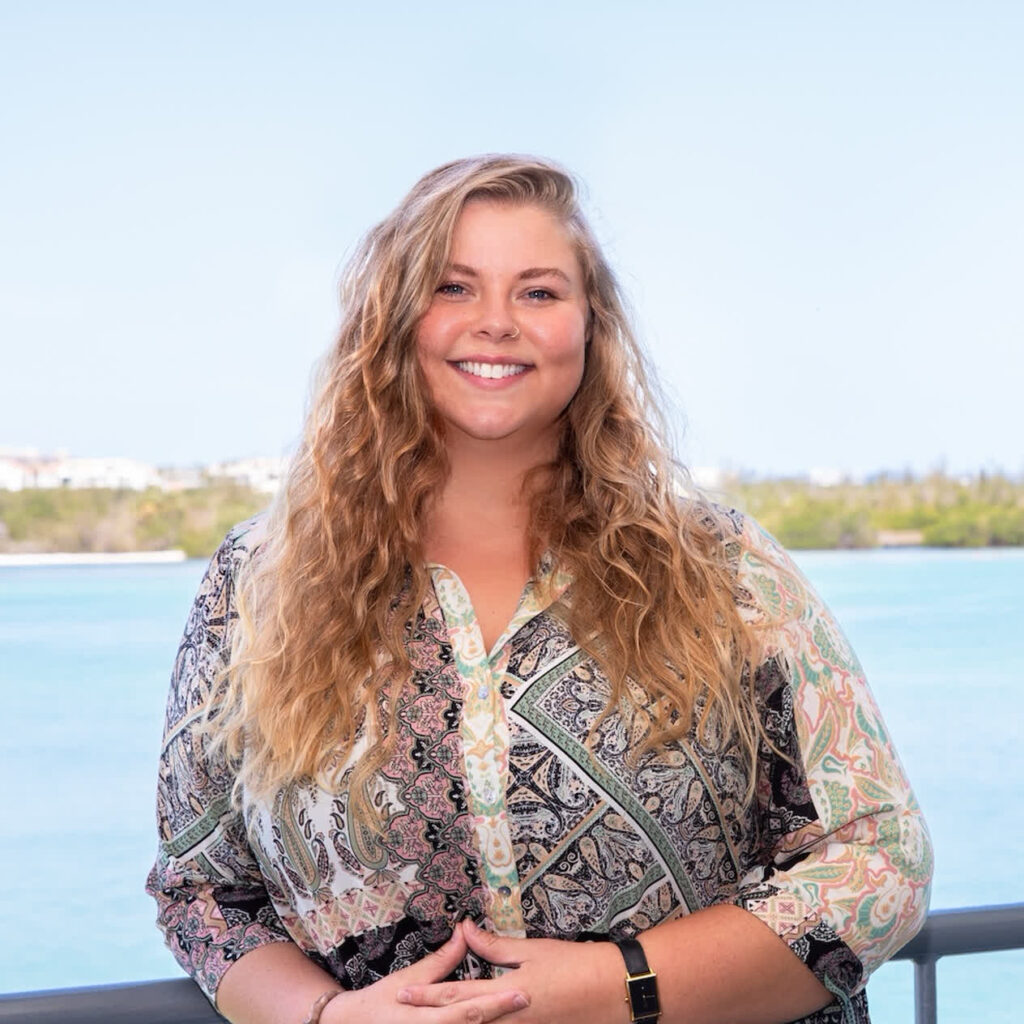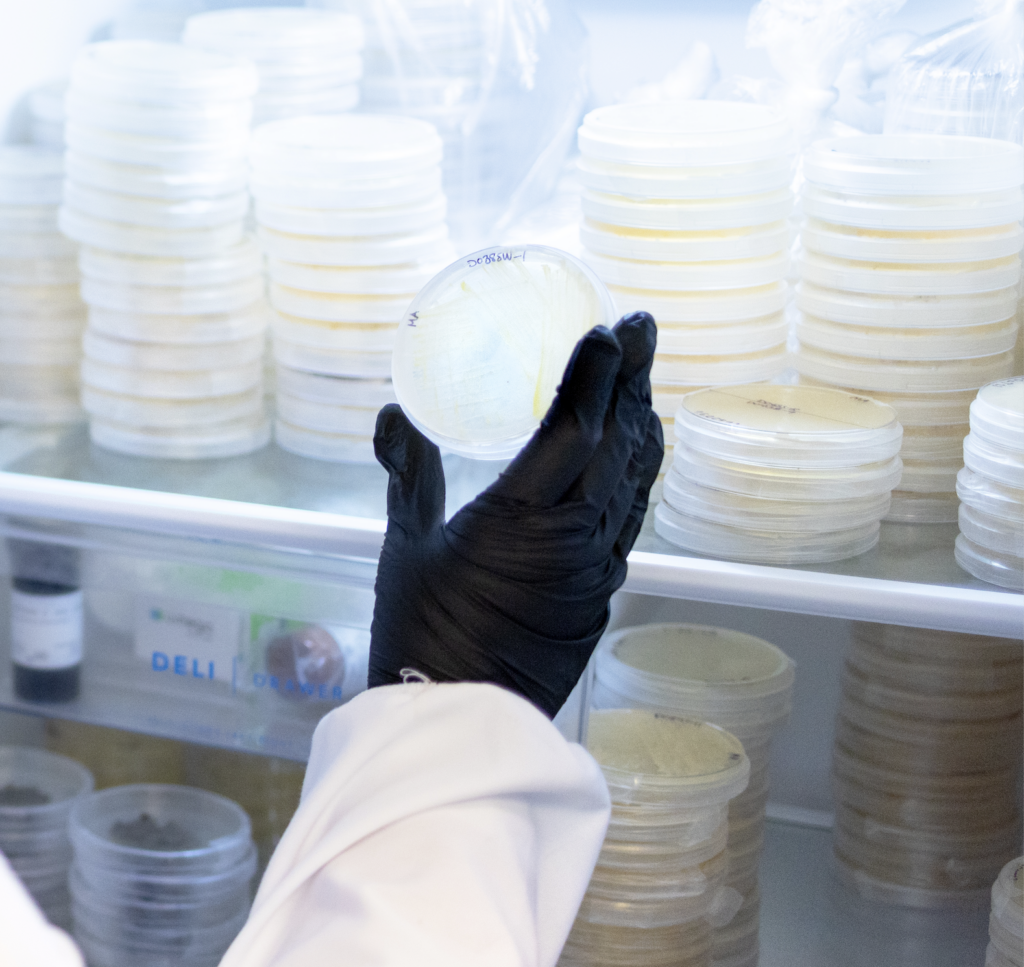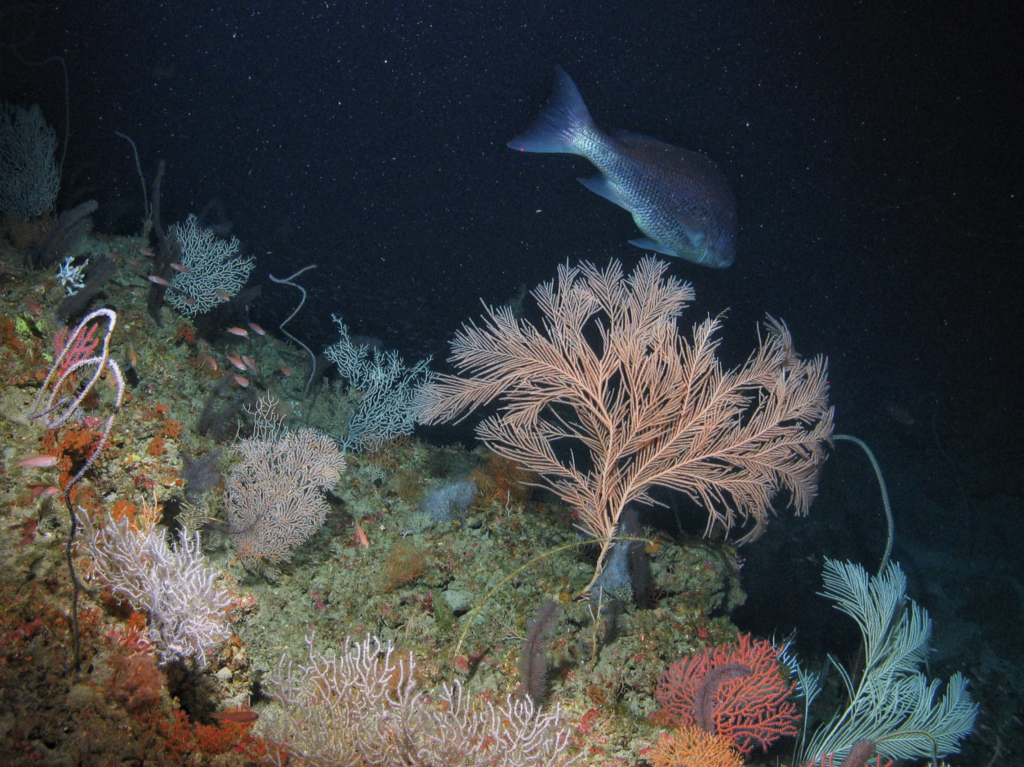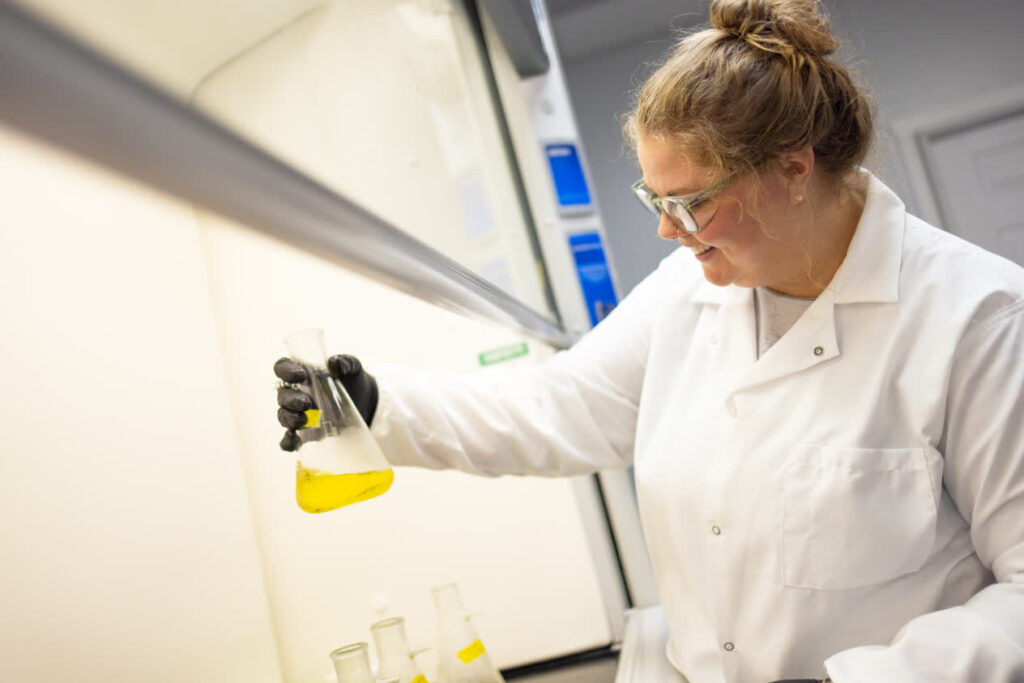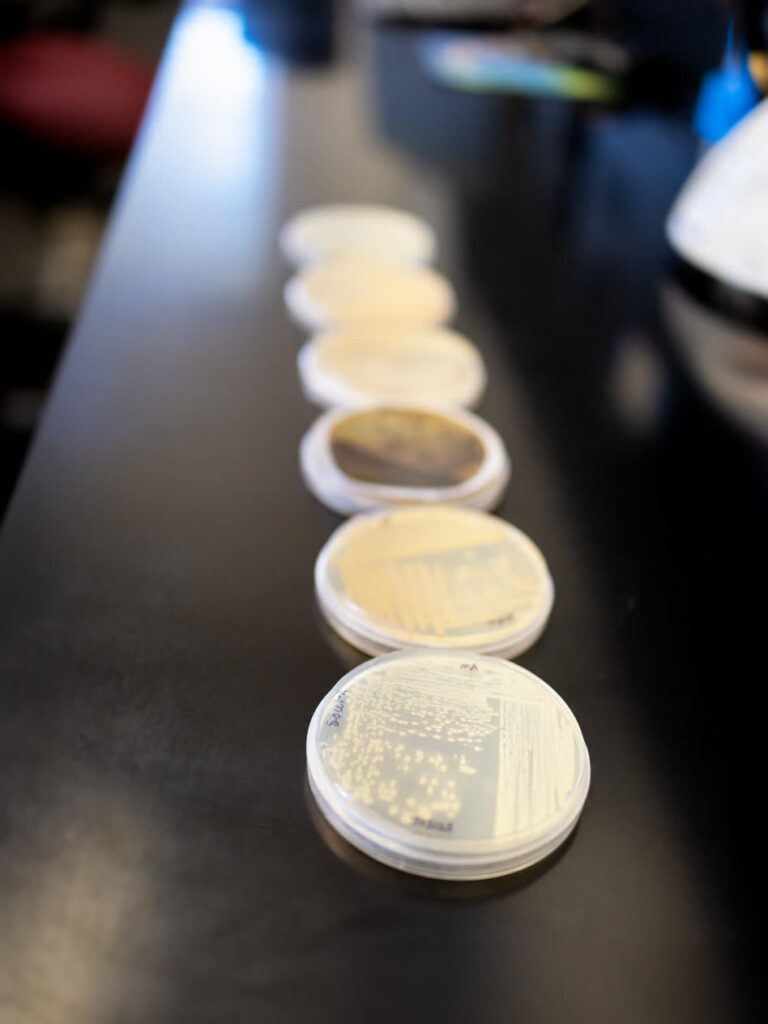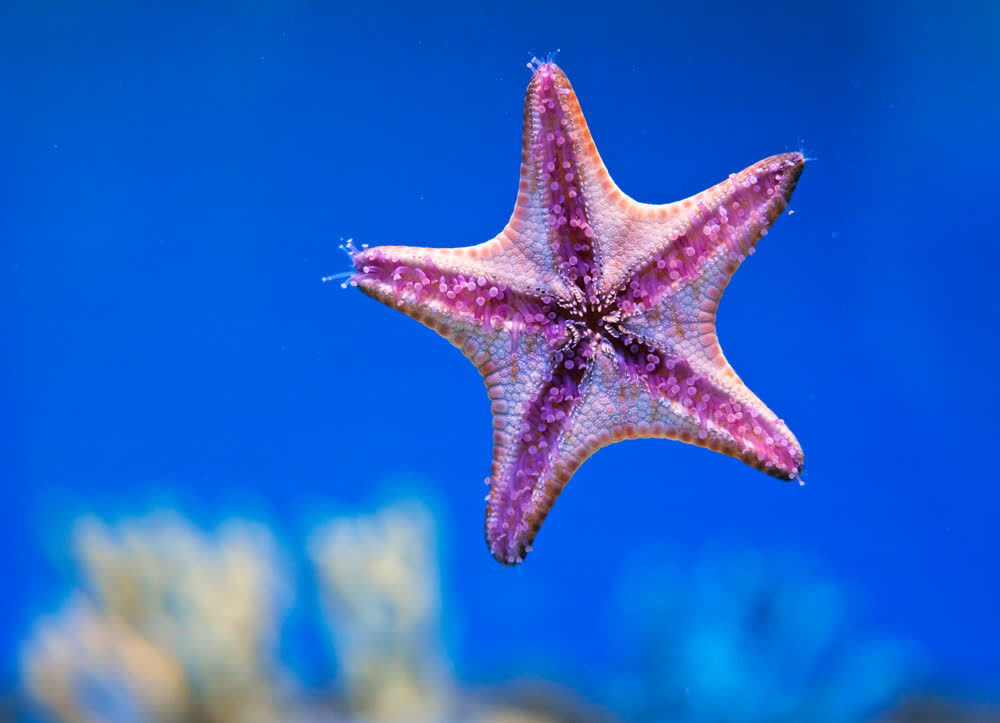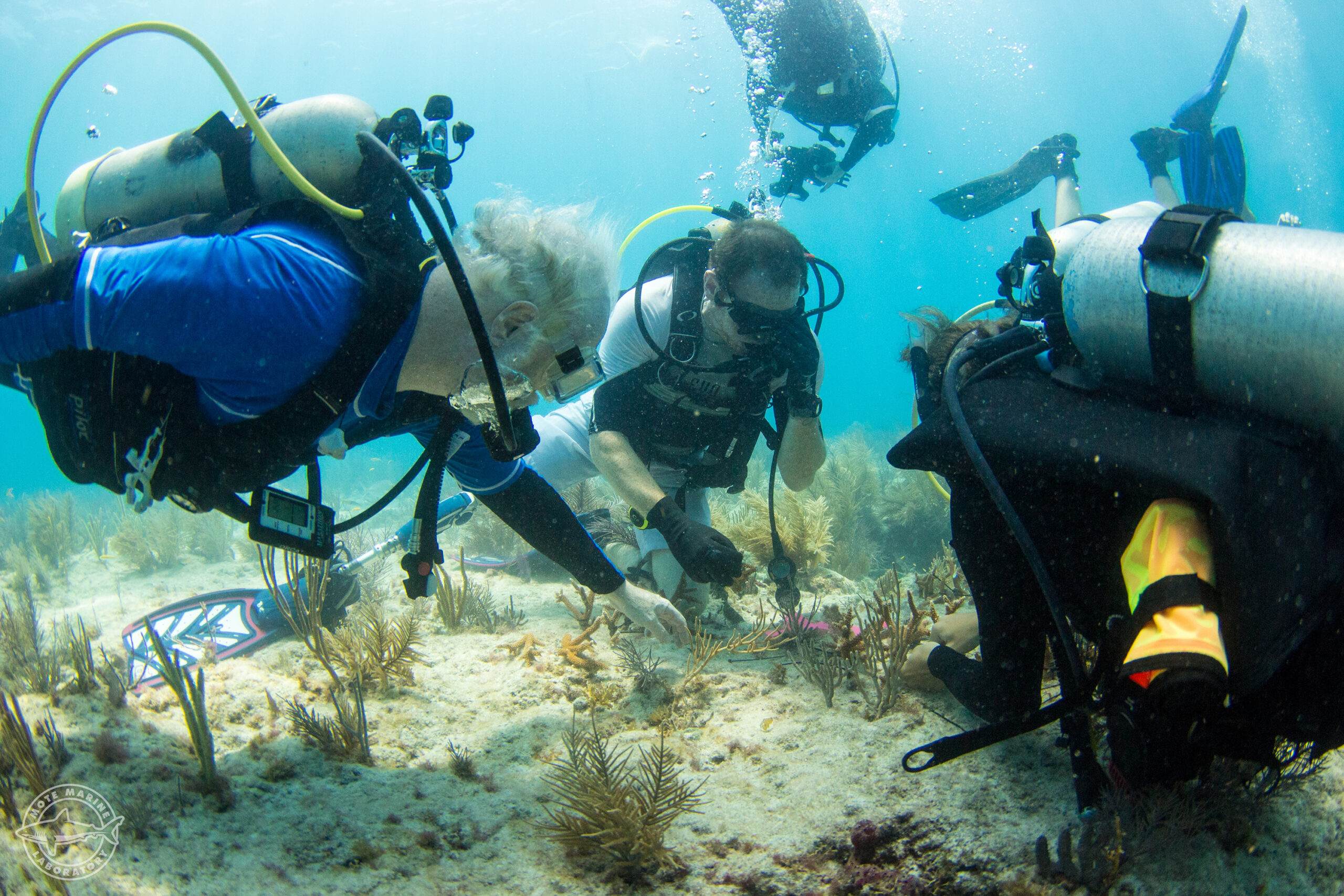The Marine Microbiology Program studies microscopic living things (called microorganisms or microbes), their roles in the marine environment and their ability to produce natural products that can benefit marine animal and human health.
The oceans cover over 70% of the Earth’s surface and are home to the most productive and biologically diverse ecosystems in the world. These diverse ecosystems harbor diverse life, including microscopic organisms that must compete for resources in places like coral reefs and deep-sea communities. This competition promotes the evolution of many different natural chemicals called secondary metabolites, or marine natural products.
Mote scientists work to identify bioactive marine natural products produced by marine microorganisms with the goal to discover new sources of medicines from the sea. Read more in our Current Research section below.
Over the years, Mote has advanced a wide variety of other marine microbiology studies through this program and several others. Together, these diverse Mote programs have advanced the scientific understanding of multiple different animal species, marine ecosystems and potential human health applications. Learn more by visiting these sections below: Previous Research & Related Programs.
Program Details
Molecular Microbiology
The goal of the molecular microbiology laboratory is to identify bioactive marine natural products produced by marine microorganisms. To accomplish this, Mote Postdoctoral Research Fellow Dr. Kirstie Francis is working on maintaining and expanding the Mote Microbial Library. From these microorganisms, she will generate an enriched fraction library from microbial extracts to screen for a variety of bioactivities for drug discovery.
NOAA Cruises & Deep Sea Microbes
Before becoming a Mote Postdoctoral Research Fellow, Dr. Kirstie Francis previously completed a fellowship through the National Academies of Science’s Gulf Research Program, where she worked as a data manager for NOAA National Centers for Environmental Information (NCEI) on the Mesophotic and Deep Benthic Communities (MDBC) portfolio. Through continuing collaboration with NOAA and USGS she has been able to join the MDBC team on two research cruises surveying sediment communities up to 2,000 meters deep in the Gulf of Mexico. From this effort she has isolated nearly 400 strains of microscopic life from deep-sea sediments and added them to the Mote Microbial Library so they can be mined for new potential sources of medicine.
Using field assessment and microbiological and molecular techniques, this program has examined marine microbes for pathogenesis (ability to cause disease) and for their production of beneficial substances, such as new sources of antibiotics.
For example, Mote scientists have helped to demonstrate that bacterial associates of corals protect the host by producing antibiotics and other beneficial compounds/nutrients; that microbial associates communicate with the coral host and other microbes to order events on the coral surface, and that there is likely to be a very complex symbiosis (a mutually beneficial relationship) between the coral, its resident algae called zooxanthellae (Symbiodinium spp.) and associated bacteria.
Mote scientists have also shown that corals harbor beneficial microbes that shift to pathogen dominance when temperatures increase (Ritchie, 2006) and in collaboration with researchers at Cornell University, have developed a computational model that simulates bacterial community dynamics within the coral mucus under tens of thousands of environmental conditions (Mao-Jones et al, 2010).
Research within this program describes bacterial symbionts of the coral endosymbiont, Symbiodinium species, and has found numerous members of the Roseobacteriales group that are specifically present in association with Symbiodinium in culture. These bacteria increase growth rates of Symbiodinium spp., produce quorum sensing (bacterial communication) compounds and increase coral larvae settlement rates.
One member of this bacterial group has been shown to produce gene transfer agents (GTAs) that may facilitate rapid adaptation to environmental change. Mote and its partners from the University of South Florida’s College of Marine Science have shown that this type of genome transfer occurs 100 million times more frequently on coral reefs than in other parts of the ocean (McDaniel et. al., 2010) and facilitates biological processes including enhanced larvae survival and settlement. In collaboration with researchers at King Abdula University of Science and Technology (KAUST), the complete genome has been sequenced for one of these beneficial bacteria.
Mote has additionally sequenced the transcriptomes and metatranscriptomes of coral larvae and bacterial biofilms (used as settlement substrate) in order to determine the effect of GTAs on coral and bacterial gene expression and bacterial community composition. Data from this effort is currently being analyzed.
Program scientists have also focused on the discovery of novel compounds from shark and stingray epidermal bacteria that display antimicrobial activity along with the development of probiotics for dolphins.
Examples of other Mote programs that have involved marine microbiology research (this list is not exhaustive):
- Coral Health & Disease Research
- Marine Biomedical Research
- Marine Immunology
- Marine & Freshwater Aquaculture Research
- ONR. $100,000. Development of Probiotics for Dolphins. 2013-2014.
- NSF/MRI. $103,000. Collaborative Research: Development of a Multi-User Molecular Facility at Mote Marine Laboratory’s Tropical Research Laboratory. August 2011-July 2012.
- Department of Defense. $270,000. Novel Compounds From Shark and Stingray Epidermal Mucus With Antimicrobial Activity Against Wound Infection Pathogens. January 2011-December 2013.
- The Dart Foundation. $540,000. Corals and Climate Change. January 2010-December 2016.
- Florida Protect Our Reefs Funding. $176,000. Symbiosis and Gene Transfer in the Reef Environment. May 2009-April 2012.
- Florida Protect Our Reefs Funding. $25,000. Deepwater Horizon Oil Effects on Corals. August 2010-July 2011.
- The Nature Conservancy. $18,000. A Rapid Response to Cold Water Stress on Corals: Monitoring Coral Health and Immunity Across Habitat Gradients in the Lower Florida Keys. November 2010-October 2011.
- Florida Sea Grant. $44,000. Coral Associated Probiotic Bacteria: Exploring Mechanisms for Potential Applications in Biocontrol of Coral Diseases. February 2008-January 2010.
- NOAA/NMFS Coral Reef Conservation Grant. $41,000. Seasonal Variability in Coral Immunity in the Florida Keys, the US Virgin Islands and Puerto Rico. September 2007-December 2009.
- NOAA. $140,000. Genetic Fingerprinting for Accountability in Coral Aquaculture. 2005-2009.
- Florida Protect Our Reefs Funding. $41,000. Linking Coral Microbial Populations and Water Column Dissolved Organic Matter Coral DOM microbes. May 2008-April 2009.
- Department of Environmental Protection/FWC. $240,000. Microbial Community Dynamics of Florida Red Tide Events. 2006-2009.
- Disney Wildlife Funds. $18,000. Protection of Floridas Threatened Corals. July 2007-June 2009.
- NOAA/NMFS Coral Reef Conservation Grant. $41,000. Seasonal Variability in Coral Immunity in the Florida Keys, the US Virgin Islands, and Puerto Rico.
- South West Florida Water Management District. $44,000. Coral Spawning Expedition in the Florida Keys. Summer 2007.
- National Geographic Society. $20,000. Master Manipulators: Corals Protect Themselves by Encouraging Bacterial Information Wars. April 2007-March 2008.
- The Charles A. and Anne Morrow Lindbergh Foundation. $10,000. Harnessing the Potential of Coral Associated Beneficial Bacteria for Sustainable Biological Control of Coral Diseases. 2007-2008.
- Florida Protect Our Reef Funding. $76,000. Temporal Variation in Beneficial Microbial Associates of Acropora Palmata in the Florida Keys. 2006-2009.
- NOAA/In house Funding. $40,000. Baseline Coral Health Assessment in the Flower Garden Banks National Marine Sanctuary. 2005-2006.
- NOAA/NMS/Mini-Grants. $70,000. Microbial Community Structure of Acropora Palmata in the Florida Keys. 2005-2007.
- NOAA. $140,000. Genetic Fingerprinting for Accountability in Coral Aquaculture. 2005-2009.
- NOAA/FKNMS. $25,000. Baseline Microbial Community Structure of Healthy Acropora Palmata in the Florida Keys. 2004-2005.
- Munson Foundation. $20,000. The Role of Microbial Communities in Coral Health and Disease. 2005-2008.
- Triad Foundation. $10,000. Start-up/Coral Reef Ecology Program. 2004.
Explore Biomedical & Technology Development programs at Mote
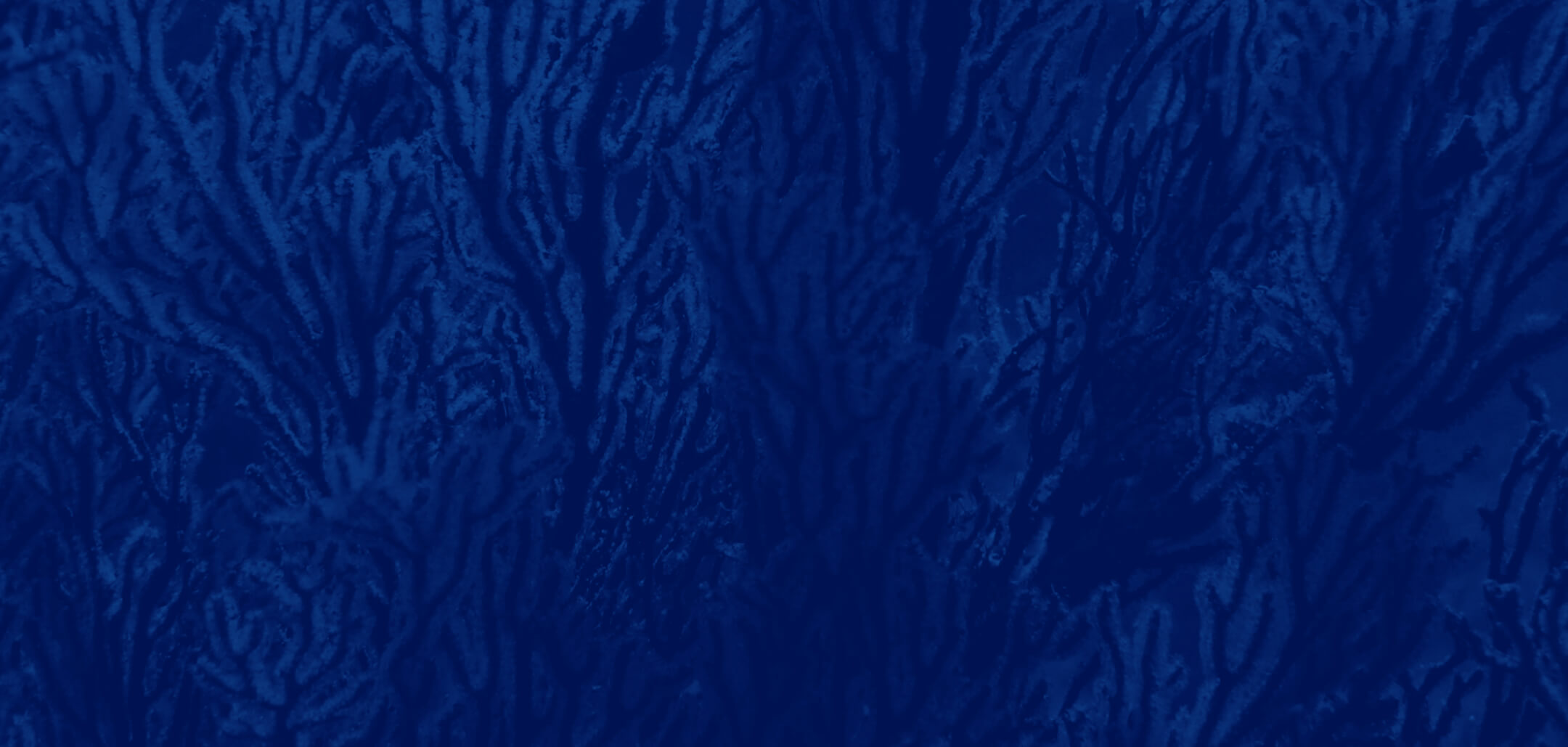
Additional Program Information
- Frydenborg, B. R., C. J. Krediet, M. Teplitski, K. B. Ritchie (2014) Temperature-Dependent Inhibition of Opportunisic Vibrio Pathogens by Native Coral Commensal Bacteria. Environmental Microbiology. DOI:10.1007/s00248-013-0334-9DOI:10.1007/s00248-013-0334-9
- Krediet, C. J., J. L. Meyer, N. Gimbrone, R. Yanong, I. Berzins, A. Algely, H. Castro, K. B. Ritchie, VJ Paul, M Teplitski (2014) Interactions between the tropical sea anemone Aiptasia pallida and Serratia marscescens, and opportunistic pathogen of corals. Environmental Microbiology Reports DOI 10.1111/1758-2229.12151
- Krediet, C., K. B. Ritchie, V. J. Paul, M. Teplitski (2013) Coral-associated micro-organisms and their roles in promoting coral health and thwarting diseases. Proceedings of the Royal Academy of Science. http://dx.doi.org/10.1098/rspb.2012.2328
- Goodbody Gringley, G., D. Wetzel, D. Gillon, E. Pulster, A. Miller and K. B. Ritchie (2013) Toxicity of Deepwater Horizon source oil and the chemical dispersant, Corexit® 9500, to coral larvae. PLoS ONE 8(1): e45574. doi:10.1371/journal.pone.0045574
- Ritchie, K. B. (2013) Microbial Communities in Coral Health and Disease. In: Choffnes, Olsen and Wizemann (Eds). Forum on Microbial Threats Board on Global Health. Institute of Medicine of the National Academies of Sciences. The National Academies Press (Washington DC), p54-58
- Krediet, C., K. B. Ritchie, M. Teplitski (2012) Characterization of the gacA-dependent behaviors in an opportunistic coral pathogen Serratia marcescens PDL100. FEMS Microbial Ecology DOI: 10.1111/1574-6941.12064
- Krediet, C., K. B. Ritchie, A. Alagely, M. Teplitski (2012) Members of native coral microbiota inhibit glycosidases and thwart colonization of coral mucus by an opportunistic pathogen. The ISME Journal, 1-11. DOI:10.1038/ismej.2012.164
- Sharp, K. and K. B. Ritchie (2012) Multi-partner interactions in corals in the face of climate change. Biological Bulletin 223: 66-77.
- McDaniel, L. D., E. C. Young, KB Ritchie, JH Paul (2012) Environmental Factors Influencing Gene Transfer Agent (GTA) Mediated Transduction in the Subtropical Ocean. PLoS ONE. 7(8): e43506.
- Ritchie, K. B. (2012) Microbial communities are important to corals. In: Kruczynski, W. L. and Fletcher, P. J. (Eds), Tropical Connections: South Florida’s marine environment. IAN Press, University of Maryland Center for Environmental Science, Cambridge, MD, p. 222.
- Ritchie, K. B. (2011) Bacterial Symbionts of Corals and Symbiodinium. In: Beneficial Microorganisms in Multicellular Life Forms, Springer-Verlag (Berlin) E. Rosenberg and U. Gophna (Eds) Chapter 9, pp 139-150
- Alagely, A., C. J. Krediet, K. B. Ritchie and M. Teplitski (2011) Signaling-mediated cross-talk modulates swarming and biofilm formation in a coral pathogen Serratia marcescens. The ISME Journal ISME J 5: 1609-1620; advance online publication, April 21, 2011; doi:10.1038/ismej.2011.45
- Ritchie, K. B. and G. W. Smith (2011) Susceptibility of Echinoderms to Infection by Pseudoalteromonas haloplanktis subsp. Tetraodonis. Pages 70-74, in Cipriano, RC, Bruckner, A, and Shchelkunov, IS, Eds. Aquatic Animal Health: A Continuing Dialogue Between Russia And The United States. Proceedings of the Third Bilateral Conference Between the United States and Russia: Aquatic Animal Health 2009.
- Daniels, C. A., Zeifman A., Heym K., Ritchie K. B., Watson, C. A., Berzins I., and Breitbart M. (2011) Spatial Heterogeneity of Bacterial Communities in the Mucus of Montastraea annularis. Marine Ecology Progress Series. 426: 29-40
- McDaniel, L. E., Young E., Delaney J, Ruhnau F., Ritchie KB, Paul JH (2010) High Frequency of Horizontal Gene Transfer in the Oceans. Science 330, 50
- Sharp, KH, KB Ritchie, P Schupp, R Ritson-Williams, and VJ Paul (2010) Bacterial Acquisition by Gametes and Juveniles from Several Broadcast Spawning Coral Species. PLoS ONE 5(5): e10898. Doi:10.1371/journal.pone.0010898
- Mao-Jones J, Ritchie KB, Jones LE, Ellner SP (2010) How microbial community composition regulates coral disease development. PLoS Biol 2010 8(3):e1000345 Manuscript received Faculty of 1000 rating.
- Eakin CM, Morgan JA, Heron SF, Smith TB, Liu G, et al. of 67 authors (2010) Caribbean Corals in Crisis: Record Thermal Stress, Bleaching, and Mortality in 2005. PLoS ONE 5(11): e13969. doi:10.1371/journal.pone.0013969
- Krediet, C, M Teplitski, KB Ritchie. (2009) Catabolite control of enzyme induction and biofilm formation in a coral pathogen Serratia marcescens PDL100. Diseases of Aquatic Organisms 87:57-66.
- Krediet, CJ, KB Ritchie, M Cohen, E Lipp, K Sutherland, and M Teplitski (2009) Utilization of mucus from the coral Acropora palmata by environmental and pathogenic isolates of Serratia marcescens. Applied and Environmental Microbiology 75(12): 3851-3858.
- Teplitski, M and KB Ritchie (2009) How Feasible is the Biological Control of Coral Disease? Trends in Ecology and Evolution. 24(7): 378-385
- Weil, E, KB Ritchie, A Croquer, JR Cunning, and GW Smith (2009) Inoculation of Vibrio spp. onto Montastraea faveolata fragments to determine potential pathogenicity. Proceedings of the 11th International Coral Reef Symposium. 7:202-205
- Cunning, JR, JE Thurmond, GW Smith, E Weil, and KB Ritchie (2009) A survey of vibrios associated with healthy and Yellow Band Diseased Montastraea faveolata. Proceedings of the 11th International Coral Reef Symposium. 7:206-210
- Ritchie, KB and BD Keller, eds. (2008). A Scientific Forum on the Gulf of Mexico: The Islands in the Stream Concept. Proceedings, 23 January 2008, Mote Marine Laboratory, Sarasota, FL. Marine Sanctuaries Conservation Series NMSP-08-04. U.S. Department of Commerce, National Oceanic and Atmospheric Administration, National Marine Sanctuary Program, Silver Spring, MD. 105 pp
- Ritchie, KB (2006) Regulation of marine microbes by coral mucus and mucus-associated bacteria. Marine Ecology Progress Series. Feature Article. 322: 1-14
- JK Culter, KB Ritchie, SA Earle, DE Guggenheim, RB Halley, KT Ciembronowicz, AC Hine, BD Jarret, WC Jaap (2006) Pulley Reef: a deep photosynthetic coral reef on the West Florida Shelf, USA Coral Reefs 25(2): 228
- Ritchie, KB and GW Smith. (2004) Microbial Communities of Coral Surface Mucopolysaccharide Layers. In: Coral Health and Disease, Springer-Verlag (Berlin) E. Rosenberg and Y. Loya (Eds.) Chapter 13, pp 259-263
- KP Sutherland and KB Ritchie (2004) White pox disease of the Caribbean Elkhorn coral, Acropora palmata. In: Coral Health and Disease, Springer-Verlag (Berlin) E. Rosenberg and Y. Loya (Eds.) Chapter 16, pp pp. 289-297

